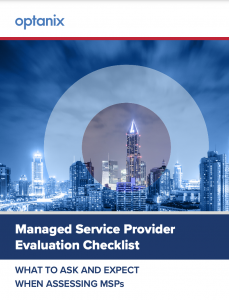
Why You Should Use a Managed Service Provider for IT Services
Why use a managed service provider (MSP) to deliver your IT services? This question comes up a lot in enterprise IT operations departments when they reach a certain phase of growth. It’s also a question that typically leads to a lot of other questions. We’ll explore several of them in this post.
 Need insight on evaluating a managed service provider for your organization? Download this MSP Evaluation Checklist to ensure you select the best partner.
Need insight on evaluating a managed service provider for your organization? Download this MSP Evaluation Checklist to ensure you select the best partner.
What is the Importance of an MSP?
Those unfamiliar with the managed services model may not be familiar with the reasons to use an MSP. Frankly, the importance of MSPs cannot be underestimated when it comes to the role they play in ensuring positive outcomes for organizations.
- When it comes to the upkeep and operation of your business service infrastructure, MSPs are the foundational provider of service assurance.
- The digital transformation of modern business is completely based on the business services that channel your interactions with customers.
- Even the day-to-day productivity of your employees depends on a managed-and-delivered infrastructure.
Why Do I Need an MSP?
Now that the importance of MSPs has been established, you may still be asking yourself “Why do I need an MSP? Why not just handle IT operations internally?” If you answer “no” to any of the following questions, you are better off using a managed service provider than taking a do-it-yourself approach:
- Does your organization have all the staff, tools and processes to deliver on your IT service needs?
- Do you really want to expend the effort to keep up with technology trends and the expertise needed to realize value?
- Is this where you want to devote your energy?
Ultimately, the primary reason to use an MSP is that allowing a reliable partner to take care of essential issues around service delivery and infrastructure maintenance frees up your team to focus on your business and satisfying your customers.
What Makes a Good Managed Service Provider?
Once you’ve made the decision to use an MSP, the next question to answer is: what makes a good managed service provider?
To start with, a good MSP must have a demonstrable track record that validates their reliability. Most MSPs can easily be vetted by checking how long they have been in business and what their customer base looks like. (Make sure you speak with their references!)
A good MSP will also have the core competency, staffing and resources to deliver on your needs. They will be able to scale and adapt to meet your demands as your business and IT environment changes. This includes possessing industry certifications and security practices that show they are keeping up with the latest trends in equipment and standards.
Finally, your MSP should have the ability to deal with abnormal situations. A good example is Covid, which affected every aspect of business. Your MSP will be at the very core of your business continuity plan and must be able to adapt to provide the resilience you need to get past unexpected obstacles. Check out “How to Choose a Managed Services Provider: 5 Questions to Ask” for more information on how to select an MSP and what questions to ask.
What Are the Benefits of Managed Services?
There are many benefits of managed services that serve as reasons to use an MSP beyond the aforementioned fact that MSPs free your team to focus on strategic initiatives for your business instead of day-to-day operations. Let’s take a look at some of the more prominent ones:
- MSPs bring about huge efficiencies in capital investment when it comes to upfront staffing and infrastructure costs.
- The service assurance that MSPs provide has a direct correlation to higher levels of customer satisfaction due to the increased dependability and reliability of the delivery infrastructure.
- MSPs have the ability to keep up with advances in technology that can drive the digital transformation of your business.
- While digital transformation is a strategic need, MSPs are equally effective at responding rapidly to your tactical needs, such as having to scale to deal with short-term demands.
These are just a few of the benefits of managed IT services. For further evidence on why you should use a managed service provider, read “7 Managed Service Provider Benefits You Can Expect from Outsourcing”.